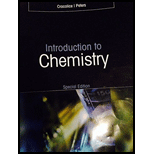
Introduction to Chemistry, Special Edition
6th Edition
ISBN: 9781337035934
Author: Cracolice/Peters
Publisher: Cengage Learning
expand_more
expand_more
format_list_bulleted
Concept explainers
Question
Chapter 12, Problem 11E
Interpretation Introduction
Interpretation:
The meaning of orbital overlap in the formation of a covalent bond is to be stated.
Concept introduction:
The compounds in which the ultimate structural unit is an individual particle known as molecule are known as molecular compounds. The atoms in a molecule are held together by a covalent bond. In covalent bonds, the atoms share one or more pairs of electrons.
Expert Solution & Answer
Want to see the full answer?
Check out a sample textbook solution
Students have asked these similar questions
reaction scheme for C39H4202
Hydrogenation of Alkyne (Alkyne to
Alkene)
show reaction (drawing) please
Give detailed mechanism Solution with explanation needed. Don't give Ai generated solution
Show work with explanation needed....don't give Ai generated solution
Chapter 12 Solutions
Introduction to Chemistry, Special Edition
Ch. 12 - Write the electronic configuration for the ions of...Ch. 12 - A monoatomic ion with a charge of 1 has an...Ch. 12 - Identify by symbol two positively charged...Ch. 12 - Considering only ions with charges of 1+,2+,1, and...Ch. 12 - Write the symbols of two ions that are...Ch. 12 - Considering only ions with charges of 1+,2+,1, and...Ch. 12 - Prob. 7ECh. 12 - Prob. 8ECh. 12 - When potassium and chlorine react and form an...Ch. 12 - Fill in the blanks with the smallest integers...
Ch. 12 - Prob. 11ECh. 12 - Prob. 12ECh. 12 - Prob. 13ECh. 12 - Prob. 14ECh. 12 - Prob. 15ECh. 12 - Prob. 16ECh. 12 - Prob. 17ECh. 12 - Prob. 18ECh. 12 - Prob. 19ECh. 12 - Prob. 20ECh. 12 - Prob. 21ECh. 12 - Consider the following bonds: GeSe, BrSe, BrGe....Ch. 12 - Prob. 23ECh. 12 - Consider the following bonds: TeSe, OTe, OSe....Ch. 12 - Prob. 25ECh. 12 - Prob. 26ECh. 12 - Prob. 27ECh. 12 - Prob. 28ECh. 12 - Prob. 29ECh. 12 - What is the maximum number of atoms to which a...Ch. 12 - Prob. 31ECh. 12 - Prob. 32ECh. 12 - Prob. 33ECh. 12 - Prob. 34ECh. 12 - Prob. 35ECh. 12 - Prob. 36ECh. 12 - Prob. 37ECh. 12 - Prob. 38ECh. 12 - Prob. 39ECh. 12 - Prob. 40ECh. 12 - Prob. 41ECh. 12 - Prob. 42ECh. 12 - Prob. 43ECh. 12 - Prob. 44ECh. 12 - Prob. 45ECh. 12 - Prob. 46ECh. 12 - Prob. 47ECh. 12 - Prob. 48ECh. 12 - Which orbitals of each atom overlap in forming a...Ch. 12 - Prob. 50ECh. 12 - Prob. 51ECh. 12 - A monatomic ion with a 2 charge has the electron...Ch. 12 - Prob. 53ECh. 12 - Prob. 54ECh. 12 - Prob. 55ECh. 12 - Prob. 56ECh. 12 - Prob. 57ECh. 12 - Prob. 58ECh. 12 - Prob. 59ECh. 12 - Prob. 60ECh. 12 - Prob. 61ECh. 12 - Which ions among the following are isoelectronic...Ch. 12 - Prob. 12.2TCCh. 12 - Prob. 12.3TCCh. 12 - Prob. 12.4TCCh. 12 - Prob. 12.5TCCh. 12 - Prob. 1CLECh. 12 - Prob. 2CLECh. 12 - Prob. 3CLECh. 12 - Prob. 4CLECh. 12 - Prob. 5CLECh. 12 - Prob. 6CLECh. 12 - Write the electron configurations for the oxide...Ch. 12 - Arrange the following bonds in order of decreasing...
Knowledge Booster
Learn more about
Need a deep-dive on the concept behind this application? Look no further. Learn more about this topic, chemistry and related others by exploring similar questions and additional content below.Similar questions
- Pleasssssseeee solve this question in cheeemsirty, thankss sirarrow_forwardThe Ksp for lead iodide ( Pbl₂) is 1.4 × 10-8. Calculate the solubility of lead iodide in each of the following. a. water Solubility = mol/L b. 0.17 M Pb(NO3)2 Solubility = c. 0.017 M NaI mol/L Solubility = mol/Larrow_forwardPleasssssseeee solve this question in cheeemsirty, thankss sirarrow_forward
arrow_back_ios
SEE MORE QUESTIONS
arrow_forward_ios
Recommended textbooks for you
 Introductory Chemistry: An Active Learning Approa...ChemistryISBN:9781305079250Author:Mark S. Cracolice, Ed PetersPublisher:Cengage LearningChemistry: Matter and ChangeChemistryISBN:9780078746376Author:Dinah Zike, Laurel Dingrando, Nicholas Hainen, Cheryl WistromPublisher:Glencoe/McGraw-Hill School Pub Co
Introductory Chemistry: An Active Learning Approa...ChemistryISBN:9781305079250Author:Mark S. Cracolice, Ed PetersPublisher:Cengage LearningChemistry: Matter and ChangeChemistryISBN:9780078746376Author:Dinah Zike, Laurel Dingrando, Nicholas Hainen, Cheryl WistromPublisher:Glencoe/McGraw-Hill School Pub Co General, Organic, and Biological ChemistryChemistryISBN:9781285853918Author:H. Stephen StokerPublisher:Cengage Learning
General, Organic, and Biological ChemistryChemistryISBN:9781285853918Author:H. Stephen StokerPublisher:Cengage Learning Chemistry: Principles and PracticeChemistryISBN:9780534420123Author:Daniel L. Reger, Scott R. Goode, David W. Ball, Edward MercerPublisher:Cengage Learning
Chemistry: Principles and PracticeChemistryISBN:9780534420123Author:Daniel L. Reger, Scott R. Goode, David W. Ball, Edward MercerPublisher:Cengage Learning Chemistry for Engineering StudentsChemistryISBN:9781337398909Author:Lawrence S. Brown, Tom HolmePublisher:Cengage Learning
Chemistry for Engineering StudentsChemistryISBN:9781337398909Author:Lawrence S. Brown, Tom HolmePublisher:Cengage Learning World of Chemistry, 3rd editionChemistryISBN:9781133109655Author:Steven S. Zumdahl, Susan L. Zumdahl, Donald J. DeCostePublisher:Brooks / Cole / Cengage Learning
World of Chemistry, 3rd editionChemistryISBN:9781133109655Author:Steven S. Zumdahl, Susan L. Zumdahl, Donald J. DeCostePublisher:Brooks / Cole / Cengage Learning

Introductory Chemistry: An Active Learning Approa...
Chemistry
ISBN:9781305079250
Author:Mark S. Cracolice, Ed Peters
Publisher:Cengage Learning

Chemistry: Matter and Change
Chemistry
ISBN:9780078746376
Author:Dinah Zike, Laurel Dingrando, Nicholas Hainen, Cheryl Wistrom
Publisher:Glencoe/McGraw-Hill School Pub Co

General, Organic, and Biological Chemistry
Chemistry
ISBN:9781285853918
Author:H. Stephen Stoker
Publisher:Cengage Learning

Chemistry: Principles and Practice
Chemistry
ISBN:9780534420123
Author:Daniel L. Reger, Scott R. Goode, David W. Ball, Edward Mercer
Publisher:Cengage Learning

Chemistry for Engineering Students
Chemistry
ISBN:9781337398909
Author:Lawrence S. Brown, Tom Holme
Publisher:Cengage Learning

World of Chemistry, 3rd edition
Chemistry
ISBN:9781133109655
Author:Steven S. Zumdahl, Susan L. Zumdahl, Donald J. DeCoste
Publisher:Brooks / Cole / Cengage Learning
Types of bonds; Author: Edspira;https://www.youtube.com/watch?v=Jj0V01Arebk;License: Standard YouTube License, CC-BY